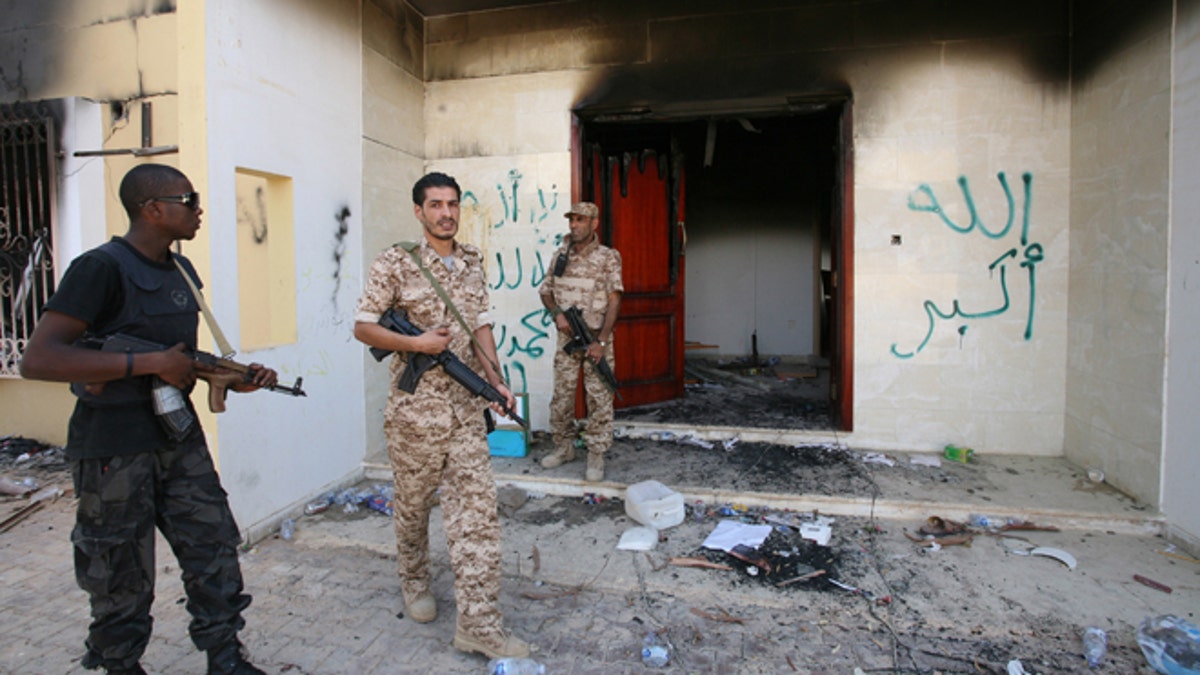
Sept. 14, 2012: Libyan military guards check one of the burnt out buildings at the U.S. Consulate in Benghazi, Libya, during a visit by Libyan President Mohammed el-Megarif to express sympathy for the death of American ambassador to Libya Chris Stevens and his colleagues in the Sept. 11, 2012 attack on the consulate. (AP)
Al Qaeda's expansion in Libya, following the successful terrorist attack on the U.S. consulate and CIA annex in Benghazi on Sept. 11, is part of a long-term plan by Al Qaeda senior leadership, according to a seasoned counterterrorism investigator.
"Al Qaeda's leader Ayman al-Zawahiri has long had his sights on Libya, and what he devised long ago was a plan to send senior operatives from Pakistan and elsewhere into Libya to build up Al Qaeda's clandestine network," Tom Joscelyn, a senior fellow with Foundation for Defense of Democracies, told Fox News.
Joscelyn, who is well known in the counterterrorism world for his "drill-down" on Al Qaeda operatives, said the vacuum left after the attack in Benghazi has created another opening which has allowed the terrorist network to "capitalize on the anti-American momentum and to show how they do have cards to play around the world."
According to an August report by the Library of Congress in conjunction with military analysts, at least two Al Qaeda operatives -- Abu Anas al Libi and Abd al Baset Azzouz -- answer directly to Zawahiri.
Joscelyn said a "witches’ brew" of three basic elements now creates fertile ground in Libya for the establishment of a safe haven. They include those dispatched by Al Qaeda senior leadership in Pakistan; the Al Qaeda affiliate in North Africa known as Al Qaeda in the Islamic Maghreb; and local militias which are sympathetic to Al Qaeda and led by former Guantanamo detainee Abu Sufian Ben Qumu.
This week, the London Telegraph cited western intelligence reports indicating the Al Qaeda affiliate in North Africa is now on the move in southwestern Libya to create the space needed for training and planning operations against the West. The Libyan town of Ghat near the Niger border is also a well-known transiting point for weapons.
The top commander for U.S. forces in Africa, Gen. Carter Ham, told the George Washington University Homeland Security Policy Institute earlier this week that the growth of Islamist movements now appears to be an arc of instability stretching from Mali and Nigeria to Somalia and Yemen in the East.
"What I worry about more than anything, though -- rather than each of those individual organizations, while they are indeed dangerous and important -- it is a growing linkage, growing network and collaboration and synchronization amongst various extremist organizations which I think pose the greatest threat to regional stability more broadly across Africa, certainly into Europe, United States as well," Ham said.
Joscelyn's research strongly suggests that while groups such as Ansar al-Sharia, also implicated in the consulate attack along with AQIM, publicly distance themselves from Al Qaeda leadership in Pakistan, there are too many parallels to ignore.
"There has been a big push to distance Ansar al-Sharia in Benghazi from the others and from Al Qaeda, labeling the organization purely ‘local.’ But its involvement in the consulate attack, ties to AQIM, and sharing of a brand name that is used by other Al Qaeda-affiliated groups should give one pause when dismissing its ties to Al Qaeda,” he said.
As early as next week, the State Department is expected to designate the Syrian opposition group Jabhat al-Nusra as a terrorist entity. It is seen as an outgrowth of Al Qaeda in Iraq, in that many of the group's leaders and members honed their skills against U.S. and coalition forces there.
Joscelyn says this means that the Al Qaeda "global jihadist ideology" has been adopted within some elements of the Syrian rebels, making it harder -- if not impossible -- for the U.S. to identify friendly forces. Since December last year, there have been more than 50 suicide bombings in Syria and the majority, with 41, claimed by al-Nusra,
"The big takeaway right now is that the U.S. government is not responding to provocative terrorist acts against even our U.S. diplomats and that shows American weakness around the Muslim world,” he said.




